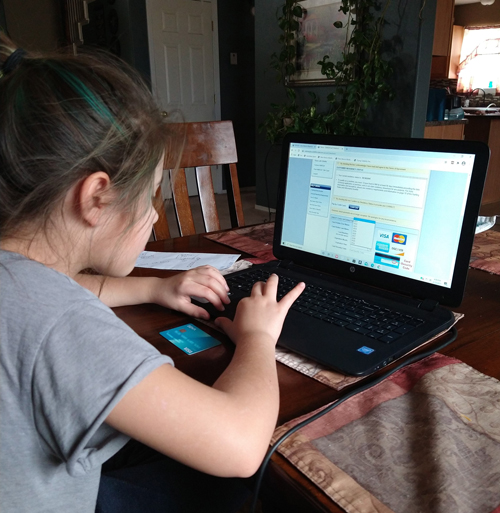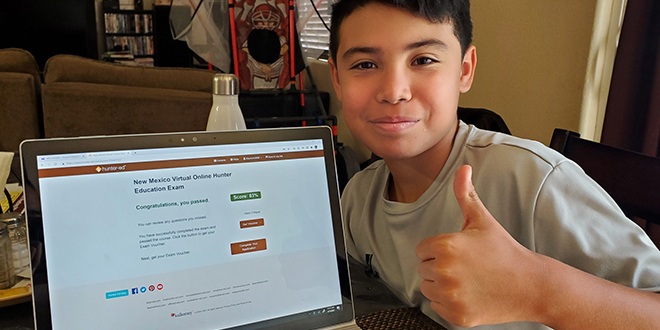To put things lightly, this pandemic changed the way things operate. By now, you’re well-associated with social distancing, business and other organization offices being closed and all the extra safety steps put into place and the Department was certainly not – ahem – immune to those.
The extra efforts from New Mexico Game and Fish employees to work around office closures while still offering email and phone assistance to those wishing to apply for the big game draw – on top of the normal email and call load – were extraordinary, and the folks working hard to reflect positively on this agency should be lauded in far more than writing.
But I’d like to focus on one challenge the Department faced in particular: our Hunter Education program.
Hundreds of New Mexico youth go through these free Hunter Education classes each year. And the demand for classes is never higher than when the big game draw deadline approaches. But offices remained closed and in-person activities were cancelled or postponed for safety.

Those kids (and often adults too) could have easily been another victim of “the year that wasn’t,” with many events being cancelled in 2020 into 2021, but Jennifer Morgan (Hunter Education Program Coordinator), Megan Otero (Assistant Hunter Education Program Coordinator) and Roselyn Washington (Hunter Education Office Administrator) completely changed the class delivery system to continue to reach New Mexico’s future hunters.
Steadfast on safety instruction, Jennifer and her team started using a remote video conferencing program to conduct classes virtually.
“The shift from in-person hunter education to virtual posed quite a challenge in the beginning, but with some practice and a little trial and error, we were able to provide several course opportunities to our young hunters,” Morgan said.
Cameras and reliable internet connection were key, but even then, there could be technical issues to work around. Imagine needing to instruct a young student on how to safely handle a firearm, including different carrying and shooting positions, without being there in person to more easily demonstrate or adjust them physically.
“I think the shift was easier on our students, than on staff and volunteers, as they had already been acclimated to some form of virtual learning platform when students shifted to online and virtual learning in March 2020. The most daunting task was how to keep the course engaging and how we were going to incorporate the safe firearm handling sessions and evaluations that play an integral role in any in-person hunter education experience,” Morgan said.
Classes were held in the evenings on Monday through Thursday. Students then tested on Fridays. After a full day of work, Department employees and incalculably-valuable volunteers gave engaging presentations, led smaller “breakout” sessions with students and played videos and animations to capture the attention of students, who themselves had already been through busy days of schools beforehand. Just as with any in-person class, perfect attendance was required along with passing a hands-on proficiency evaluation and written test.
“We knew we needed to adapt and evolve to provide this service to our young hunters. The only way to grow sometimes is to think way outside the proverbial box so as to not let hard times get the better of you,” Morgan said.
The novel approach did not go unnoticed, as often staff from Hunter Education programs from different states and agencies would sit-in to observe the virtual classes New Mexico was holding.
Since July 2020, the Department has hosted 239 students in 14 virtual hunter education courses. Courses were initially offered once a month with course offerings increasing in the months leading up to the hunt application deadlines. Virtual courses will continue to be offered until in-person learning is able to safely resume.
Virtual learning is certainly not a replacement for in-person learning, but it has allowed our Hunter Education program’s dedicated staff to continue their excellent work and to provide a much-needed service: teaching the next generation of safe and ethical hunters.
(Note: As a reminder, our Mentored-Youth program is available for hunters ages 8 to 17 to allow some hunting opportunities before a Hunter Education class is completed. And online (not instructor-led) classes are available on our website to students ages 10 and up: www.wildlife.state.nm.us/education/hunter-education/)
 New Mexico Wildlife magazine Conserving New Mexico's Wildlife for Future Generations
New Mexico Wildlife magazine Conserving New Mexico's Wildlife for Future Generations
